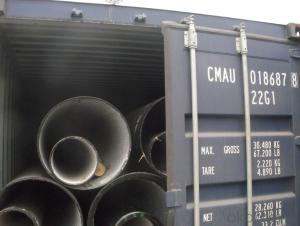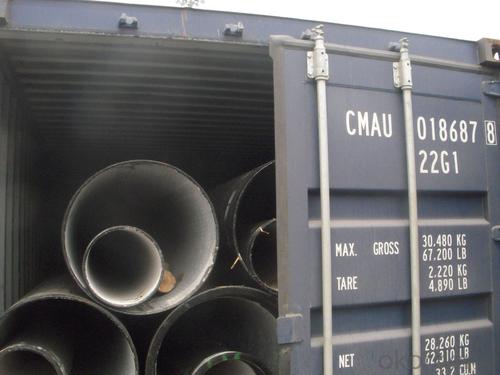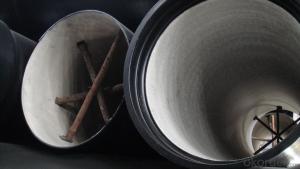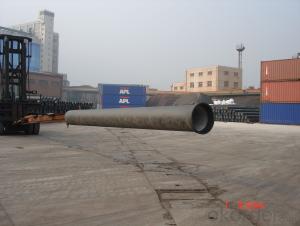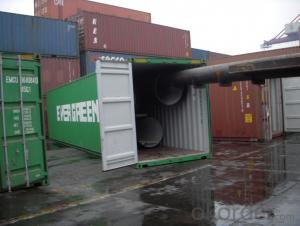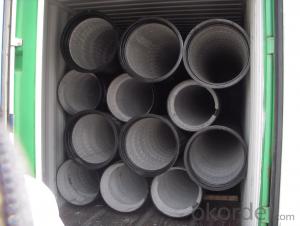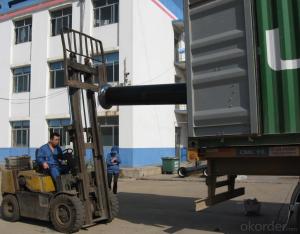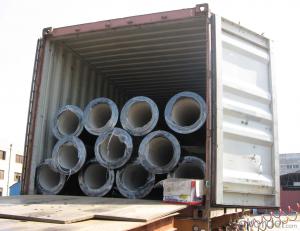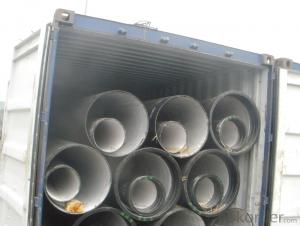DUCTILE IRON PIPE AND PIPE FITTINGS C CLASS DN900
- Loading Port:
- Tianjin
- Payment Terms:
- TT OR LC
- Min Order Qty:
- 23 pc
- Supply Capability:
- 3000 pc/month
OKorder Service Pledge
OKorder Financial Service
You Might Also Like
· Material : Ductile Cast Iron
· Size Range : DN 80mm to DN 2000mm
· Unit Effective Length : 6m or 5.7m
· Manufacture Standard: ISO 2531:1998/ EN 545:2006/EN 598:2007
· Annual capacity : 200,000 tons
· Coating Exterior: Zinc 130g/m2 according to ISO 8179-1 and bitumen coating 70 microns.
· Cement Interior: Portland Cement/ High Alumina Cement/ Sulphate Resisting Cement Lining according to ISO 4179
· Special requirements on external coating and internal lining can be applied
· We also provide accessories such as SBR/EPDM rubber gaskets, lubricant paste, pipe caps, PE sleeves, etc.
Additional Parts:
Each pipe is strictly inspected according to related standard to ensure permanently high performance.
Easy Installation at site and service free for life
Long Service Lifespan
Quotation will arrive you within 24hours once we get your inquiry.
We guarantee offering you a competitive price.
A copy of original inspection reports of pipes will be offered after shipment.
Photos of loading process will be sent to the customer after shipment effect.
We will follow-up the delivery progress after shipment effect and update to the customer on weekly basis.
- Q: The difference between flexible joint cast iron pipe and flexible anti-seismic cast iron pipe
- Nodular cast iron pipes and fittings technical manual PDF download Fan Yingjun handsome date: Author: fan manufacturing technology, in January 2006, this book introduces the ductile iron pipe interface form, quality standard, installation technology and special use of ductile cast iron pipe and other content, lists all the technical parameters for ductile iron pipes, pipe fittings interface in order to facilitate the readers to use and accessories
- Q: The role of chromium in nodular cast iron
- In order to further understand the mechanism of chromium in ductile iron, the application of electronic scanning and other test means, from chrome crystal structure, crystallization, solidification, heat treatment transformation principle, further study on the mechanism of chromium in ductile iron.
- Q: How are ductile iron pipes repaired if they get damaged?
- There are several methods available for repairing ductile iron pipes, each dependent on the severity of the damage. Below are some commonly used techniques: 1. Spot Repair: When the damage is minimal and localized, a spot repair can be performed. This involves removing the damaged section of the pipe and replacing it with a new one. The new section is typically connected to the existing pipe using mechanical couplings or flanged connections. 2. Pipe Lining: If the damage is more extensive but the pipe remains structurally sound, pipe lining is a suitable option. This method entails inserting a liner into the damaged pipe, creating a new smooth surface. Various materials like epoxy or cured-in-place pipe (CIPP) can be used as liners. The advantage of this technique is that it eliminates the need for excavation and complete replacement of the pipe. 3. Pipe Bursting: In situations where the pipes are severely damaged or deteriorated, pipe bursting may be the most optimal solution. This process involves pulling a new pipe through the damaged one, simultaneously fracturing the old pipe and substituting it with a new one. Pipe bursting is typically employed when the existing pipe is irreparable and necessitates complete replacement. 4. Welding and Patching: In certain cases, small leaks or cracks in ductile iron pipes can be rectified through welding or patching. Welding involves melting and fusing the metal to seal the damaged area. Patching, on the other hand, involves applying a specialized epoxy or composite material over the affected section to create a watertight seal. It is essential to consider factors such as the extent of the damage, accessibility to the pipe, and the proficiency of the repair crew when selecting the appropriate repair method. Regardless of the technique chosen, a thorough assessment, meticulous planning, and skillful execution are necessary to ensure a successful and long-lasting repair.
- Q: What is ductile iron pipe?
- The main components of ductile iron pipes are carbon, silicon, manganese, sulfur, phosphorus and magnesium. Execution standard GB/T13295-2003ISO2531/2003
- Q: Are ductile iron pipes more resistant to breaks and cracks than other pipe materials?
- Ductile iron pipes generally possess higher resistance to breaks and cracks compared to other pipe materials. Ductile iron, a form of cast iron treated with magnesium, exhibits increased flexibility and reduced brittleness. This enhanced flexibility empowers ductile iron pipes to endure significant pressure and external loads without incurring damage. In contrast to widely-used pipe materials such as PVC, HDPE, or steel, ductile iron pipes excel in strength and durability. They boast higher tensile strength, enabling them to withstand greater forces and pressures without succumbing to failure. Additionally, ductile iron pipes demonstrate superior impact resistance, reducing the likelihood of cracking or breaking when subjected to sudden impacts or external loads. Another advantage of ductile iron pipes lies in their ability to resist corrosion. The material naturally repels rust and remains unaffected by harsh environmental conditions, making it ideal for underground installations or areas with corrosive soils. This corrosion resistance further contributes to the pipes' longevity and overall integrity. Furthermore, ductile iron pipes possess a longer lifespan compared to other pipe materials. They are designed to endure for multiple decades, often exceeding 50 years, with minimal maintenance. This prolonged lifespan decreases the necessity for frequent replacements, resulting in time and cost savings in the long term. However, it is crucial to acknowledge that no material is entirely immune to damage or failure. Proper installation, maintenance, and adherence to industry standards and guidelines are imperative to ensure optimal performance and longevity of ductile iron pipes. Regular inspection and monitoring should also be carried out to identify potential issues or signs of deterioration, facilitating timely repairs or replacements.
- Q: Will nodular cast iron pipes rust?
- Qualified ductile iron pipe requires lining standard cement. The outer wall of pipe needs spraying zinc treatment and asphalt paint coating, and other epoxy resin paint can also be selected. Qualified ductile iron pipes can be used for more than a hundred years. The main place where rust is easily exposed is where the outer wall meets the soil because of its high humidity and high oxygen content. Qualified anticorrosion can effectively resist rust, its process principle can not give you the details.
- Q: Are ductile iron pipes available in different wall thicknesses?
- Ductile iron pipes come in various wall thicknesses, catering to diverse requirements and applications. Manufacturers produce ductile iron pipes with different wall thicknesses, aligning them with specific needs. Determining the wall thickness of a ductile iron pipe involves considering factors such as diameter, internal pressure tolerance, and soil conditions for installation. Pipes with thicker walls are ideal for higher pressure situations or challenging soil conditions. Conversely, thinner-walled pipes may suffice for lower pressure scenarios. The availability of various wall thicknesses offers flexibility in selecting the most suitable ductile iron pipe for individual projects. This ensures efficient and secure transportation of fluids or gases through the pipes.
- Q: The design uses water supply ductile iron pipe, PE corrosion protection pipe, HDPE pipe, please ask that good? What's the price of the two?
- PE pipe is hot melt connection (with thick wall smooth type, don't use the wavy), has the advantages of convenient connection, not affected by terrain, but should pay attention to cold and rain when try not to do, otherwise easily lead to cracks or Water Leakage interface touch interface. The disadvantage is not pressure, heavy machinery on the flat, but the problem is not, as long as the water does not leak, do not need to redo. Also, PE price volatility is relatively large, the size of the price difference is relatively large, a few more runs to ask the price.
- Q: How does ductile iron pipe handle thermal expansion and contraction?
- Ductile iron pipe is well-known for its ability to handle thermal expansion and contraction effectively. This is primarily due to its unique material properties and design characteristics. Firstly, ductile iron pipe has a high coefficient of linear expansion, which means it expands and contracts relatively more compared to other materials when subjected to temperature changes. This property allows the pipe to accommodate thermal expansion and contraction without causing excessive stress or deformation. Additionally, ductile iron pipes are designed with flexible joints that can absorb the movement caused by thermal expansion and contraction. These joints, such as push-on or mechanical joints, provide a certain level of flexibility and allow the pipe to expand and contract within a specific range without compromising its structural integrity. Furthermore, the material composition of ductile iron itself contributes to its ability to handle thermal expansion and contraction. Ductile iron is a type of cast iron alloy that contains nodular graphite in its microstructure, providing it with enhanced ductility and tensile strength. This inherent ductility enables the pipe to withstand the stresses induced by thermal expansion and contraction without fracturing or breaking. Overall, ductile iron pipe is designed and manufactured to effectively handle thermal expansion and contraction. Its high coefficient of linear expansion, flexible joints, and ductile material properties all work together to ensure that the pipe can accommodate temperature changes without causing any significant issues or structural failures.
- Q: Can ductile iron pipes be used for underground chemical transport systems?
- Due to their strength, durability, and resistance to corrosion, ductile iron pipes are commonly utilized in a variety of applications. However, when considering their use in underground chemical transport systems, it is crucial to take certain factors into account. Firstly, it is necessary to evaluate the type of chemicals being transported. Although ductile iron pipes are generally resistant to a wide range of chemicals, including acids, alkalis, and organic solvents, there are some chemicals that can cause corrosion or react with the iron content of the pipes, leading to degradation and potential leakage. Therefore, it is essential to assess chemical compatibility and seek advice from chemical engineers or experts to determine if ductile iron pipes are suitable for specific chemical transport applications. Secondly, the concentration and temperature of the chemicals must be considered. Elevated temperatures and high concentrations of certain chemicals can accelerate the corrosion process, potentially compromising the integrity of the pipes. Therefore, it is crucial to evaluate the operating conditions and ensure that the ductile iron pipes can withstand the chemical concentration and temperature levels. Furthermore, the potential presence of abrasive or erosive chemicals needs to be taken into consideration. If the transported chemicals contain abrasive particles or possess erosive properties, it may cause increased wear and tear on the inner surface of the pipes, reducing their lifespan and potentially leading to leaks. In such cases, it may be more appropriate to use alternative materials with higher resistance to abrasion or erosion. Lastly, it is important to adhere to relevant regulations and standards. Different countries or regions may have specific requirements for underground chemical transport systems, including the selection of materials. Therefore, it is crucial to ensure that ductile iron pipes meet the necessary standards and are approved for use in such applications. In conclusion, while ductile iron pipes have many desirable properties for various applications, including underground use, their suitability for chemical transport systems is dependent on several factors. Before deciding to use ductile iron pipes for underground chemical transport systems, it is essential to carefully evaluate chemical compatibility, concentration and temperature levels, the presence of abrasive or erosive chemicals, and compliance with regulations. Seeking guidance from experts in the field is highly recommended to ensure the safety and effectiveness of the chosen piping material.
Send your message to us
DUCTILE IRON PIPE AND PIPE FITTINGS C CLASS DN900
- Loading Port:
- Tianjin
- Payment Terms:
- TT OR LC
- Min Order Qty:
- 23 pc
- Supply Capability:
- 3000 pc/month
OKorder Service Pledge
OKorder Financial Service
Similar products
Hot products
Hot Searches
Related keywords
